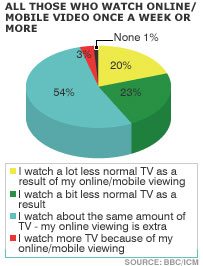YouTube vs. TV or PR vs. Surveys

Google began its “we’re not your competitor, we’re your friend” PR campaign aimed at television networks last week, with one of its first official YouTube releases, as I dissect in “Google’s fuzzy YouTube logic” and "Google to TV networks: Believe in YouTube”:
In “Google: YouTube won’t cannibalize TV” I cite Google's top South East Asia exec, Richard Kimber, pitching the same “belief” in Google-YouTube-TV Network love:Google YouTube announced to the world: 'After one month, CBS content among most viewed videos on YouTube, Nearly 30 Million Views Since Partnership Began'…
What does the “sheer number of video views” do for CBS? Google, YouTube and CBS ‘believe’ in the power of YouTuber love…
'Although the success of these shows on YouTube is not the sole cause of the rise in television ratings, both companies believe that YouTube has brought a significant new audience of viewers to each broadcast.'
Google wields a mighty PR sword. A pesky survey of British TV viewers put foth by the British Broadcasting Corporation, however, does not support Google-YouTube-CBS “beliefs”:The media lends itself to short bursts of content, so rather than being a full TV channel it generally will be used for teasers. Typically, people are watching shorter clips and then they will still go to TV to watch the full show.
We're seeing that in the US, with shows like the David Letterman Show using it as a way of promoting activity on the TV channel.
The online video boom is starting to eat into TV viewing time, an ICM survey of 2,070 people for the BBC suggests.
Some 43% of Britons who watch video from the internet or on a mobile device at least once a week said they watched less normal TV as a result.
Also, in stark contrast to Google-YouTube-CBS “beliefs,” only 3% said online video inspired them to watch more TV.
PR beliefs, survey suggestions…conflicting conclusions, but similar overreaching.
Moral of the PR and survey stories? As fellow ZDNet blogger Larry Dignan has aptly noted:
Every story you read has a motive.
